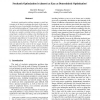Free Online Productivity Tools
i2Speak
i2Symbol
i2OCR
iTex2Img
iWeb2Print
iWeb2Shot
i2Type
iPdf2Split
iPdf2Merge
i2Bopomofo
i2Arabic
i2Style
i2Image
i2PDF
iLatex2Rtf
Sci2ools
141
click to vote
FOCS
2004
IEEE
2004
IEEE
Stochastic Optimization is (Almost) as easy as Deterministic Optimization
Stochastic optimization problems attempt to model uncertainty in the data by assuming that (part of) the input is specified in terms of a probability distribution. We consider the well-studied paradigm of 2-stage models with recourse: first, given only distributional information about (some of) the data one commits on initial actions, and then once the actual data is realized (according to the distribution), further (recourse) actions can be taken. We give the first approximation algorithms for 2-stage discrete stochastic optimization problems with recourse for which the underlying random data is given by a "black box" and no restrictions are placed on the costs in the two stages, based on an FPRAS for the LP relaxation of the stochastic problem (which has exponentially many variables and constraints). Among the range of applications we consider are stochastic versions of the set cover, vertex cover, facility location, multicut (on trees), and multicommodity flow problems.
Discrete Stochastic Optimization | FOCS 2004 | Stochastic Optimization Problems | Theoretical Computer Science | Well-studied Paradigm |
Related Content
| Added | 20 Aug 2010 |
| Updated | 20 Aug 2010 |
| Type | Conference |
| Year | 2004 |
| Where | FOCS |
| Authors | David B. Shmoys, Chaitanya Swamy |
Comments (0)

